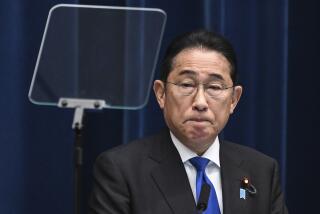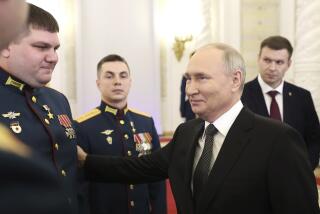Putin to resign as chairman of United Russia party
- Share via
MOSCOW — President-elect Vladimir Putin said Tuesday that he would resign as chairman of the United Russia party after his inauguration in early May and indicated that outgoing President Dmitry Medvedev should serve as both prime minister and leader of the party.
Medvedev stepped down after one term as president to allow Putin, who was serving as prime minister, to again seek the presidency, which he held for two terms before Medvedev’s tenure. Putin was elected last month after a lengthy series of demonstrations in which tens of thousands of opponents took to the streets to demand an end to Putin’s rule and to call United Russia “the party of swindlers and thieves.”
Putin on Tuesday thanked United Russia for its support but said that once in office, he intended to become “an above-party figure.”
“The constitution doesn’t forbid the president to be a member of some party, but given the spirit of our current political life, the president is primarily a consolidating figure for all political forces, for all citizens of the country,” Putin said in a short speech. “In this connection, after the inauguration which is to take place May 7 of this year, I think it correct for myself to drop my powers as the United Russia party chairman.”
The move will be good for the party and for Medvedev, said Dmitry Orlov, director of the Agency of Political and Economic Communications, a Moscow-based think tank.
“Medvedev needs political support in his new job, and as the leader of the ruling party he will be a much more powerful figure than a politician lacking such a support,” Orlov said
Other experts disagreed.
“The United Russia will very soon repeat the fate of the late CPSU [the Soviet Communist Party] and go into oblivion much faster than they think,” said Stanislav Belkovsky, president of the National Strategy Institute, another Moscow-based think tank.
“That is the end of Medvedev as a politician, and we won’t witness another trading-places scheme with his participation,” Belkovsky said.
Medvedev, speaking at a meeting of a Kremlin advisory board, said Tuesday that as he shifts jobs, he will concentrate on a political reform program of combating poverty, unemployment and corruption. By 2018, he added, life expectancy in Russia will increase from 71 to 75 years.
“It is absolutely unfair, simply humiliating, to consider Russia a nation incapable of free life, a nation which doesn’t deserve freedom,” Medvedev said.
More to Read
Sign up for Essential California
The most important California stories and recommendations in your inbox every morning.
You may occasionally receive promotional content from the Los Angeles Times.










